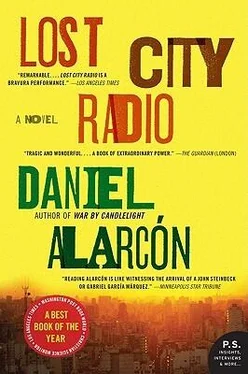Victor’s mother stepped into the canteen. She was met with cheers from the soldiers. The captain, his ruddy face beaming, proposed a toast — To the children! he shouted importantly. Manau watched Adela blush and then frown. Were they making fun of her? The idea scandalized him. She wore a simple blue skirt and a thin white T-shirt decorated with a sailboat. The shirt was old, the neck stretched wide enough to reveal her right shoulder. She was barefoot. When the toast had finished, the captain insisted she sit with them. “For only a moment, madam,” he said. She demurred, instead walked up to Manau and asked if she could speak to him. In private.
It took his breath away. “Of course,” he said too quickly. He almost added, “madam,” then didn’t. He wondered if it were bad taste. Did his breath smell of beer? Did he seem drunk? He offered her a smile and pushed these thoughts aside. Was there a trace of romance in her tightly pursed lips?
He followed her outside. The children didn’t bother scattering. They stood crowded around the window, surely up to no good. Tonight, he thought, we are the carnival. We are the circus at the center of the world. Let the generator hum and the music play; the glasses clink and the bottles clang! God bless the coarse men and their churlish grins, the soldiers stupefied by drink — they are the children’s heroes! Again, the word we passed ahead of him, a fluttering banner, and Manau made a decision to improve his posture starting the very next day. It was a beginning, a place to start. He would improve everything about himself. Become a better man and make his mother proud. He followed Adela into the darkness that began just a few meters beyond the canteen. She held him by the arm, as if he might get away. “Your son is a good student,” he said as they walked. Was he slurring? “A real smart one.”
“I see him reading all the time,” she said. “Old books his father brought him.”
They were a distance now from the canteen. It hadn’t rained all day long, and the air was humid and full of insects. They walked slowly along the town’s empty paths, almost to the end, where the forest began.
“You asked him, Mr. Manau? About my boy’s father?”
“I did.”
“Why?” she asked.
There was a strength to her he admired. When she passed through town, Manau always noticed her calves, her supple leg muscles. They made him feel weak. Her hand was wrapped loosely around his bicep, but he knew she had him. His body, no matter how disfigured or warped by the heat, would never be to her liking. An itchy patch of skin smoldered beneath her faint touch. He had the irresistible urge to be honest. It didn’t come often.
“I’m lonely,” he whispered, shutting his eyes.
He opened them a little later — a few seconds, a minute — and she was still there. Adela had softened a bit, or seemed to. It was hard to tell in the weak light. She touched his face. “Our teachers never last very long,” she said. “It’s not easy.”
“It isn’t,” he insisted in a low voice.
The night seemed to be momentarily empty of all sound. It was her hand on his face, and only that. In an instant, it had passed. She withdrew her touch and, in the darkness, he followed her hand with his eyes. It dangled by her side, a glowing thing, and then she clasped it with the other and hid them both behind her back.
“I’m sorry,” he said.
Adela shook her head. “Victor doesn’t know the whole story. He was very young.”
“I won’t ask again,” he promised.
“It’s okay,” she said. “You didn’t know. I’ll tell him. Soon.”
“I should be going.”
“Of course,” she said.
He wanted to leave — he meant to — but instead found himself looking down at his feet, immobile, planted in the earth before her. He met her gaze. She was waiting for him.
“Yes?”
“It’s a terrible thing to ask of you.”
She shook her head, not understanding.
“It’s my skin,” he said. “I itch.”
Her head turned almost imperceptibly. “Are you asking me to scratch you?”
He nodded — was she smiling?
“Where?” Adela asked.
They were hardly a hundred meters from the canteen, from the children and the soldiers and the war stories. It was a universe away. The night was pierced with stars. When she died, he would remember this, this touch: her fingers clawing his back, softly at first, then vigorously, as if she were digging in the earth for treasure.
THERE WERE dozens of children by the time he made it back, so Manau had to wade through them to get to the door of the canteen. It was as if they had become drunk just by being near the place. They were all his students. “Mr. Manau,” they yelled. “No school tomorrow! No school!” He smiled and felt buoyant. Some of the children pulled at his pant legs. A soldier’s head poked out from the window and nodded at him. Manau didn’t spot Victor or Nico among them, and again, the idea flashed through his head that he should tell his handless landlord about the boy, but the thought lingered for just a moment, and then he was inside.
In fact, Victor was there, hidden among the children, leaning against the wall of the canteen. He was fine, he told himself, but there was a softness to everything, a pliability that he found startling. He felt that he could look at something and bend it — a tree, a rock, a cloud — and it worried him. Gingerly, he touched the knot on his head. There was no blood, only this heat within him. He felt faint. The canteen’s walls quivered, the entire structure shaking with laughter.
Inside, everything had come unmoored. Drunkenness had exploded inside, and no one had been saved. The soldiers had spread about the room like ivy, a couple of them leaned over the open window, chatting with the children, blowing smoke above their heads; the men from the bar had joined the smaller group in an oblong orbit around the captain. When Manau entered, Nico’s father raised a shout, and soon everyone was applauding the teacher. The scratching still warm on his back, the burning trails of Adela’s fingers, and now this: he felt like weeping. Manau accepted the ovation with a raised hand, and took a seat between his landlord and the captain. A glass was poured, and he raised it to his lips, nodding first at the men gathered around him.
“Mr. Zahir was just telling us about his hands,” the captain said as Manau drank. “Weren’t you?”
Manau’s landlord nodded and cleared his throat. He was hopelessly drunk, his gaze scattered and diffuse. “It wasn’t far from here, you know.” He motioned with a waving stump, and Manau saw the scarred flesh, dimpled and leathery, that closed around the place where his arms ended so abruptly.
The captain poured Zahir a glass. “Terrible,” he said.
“I was accused of stealing from the communal plot. It’s overgrown now, and no one tends to it, but it used to be at the edge of the town, just past the plaza. They did tadek. ”
Tadek , Manau thought, shaking his head. “Here? Who?”
“Why, the IL, my friend. Who else would commit such an atrocity?” the captain said. “Please, go on.”
“It was Adela’s boy that chose me,” Zahir said. “He was only four years old. Let’s go, they said. I went.” He motioned for more beer, and one of the soldiers filled the glass and passed it to him. Zahir began the balancing act, but the glass slipped from between his wrists. He stopped. “But why speak of this?” he cried, turning to the captain.
“These soldiers don’t remember, Don Zahir. They don’t know. Even this teacher of yours, this learned man — even he doesn’t remember.”
“But I didn’t live here then. I’m from the city.”
Читать дальше












